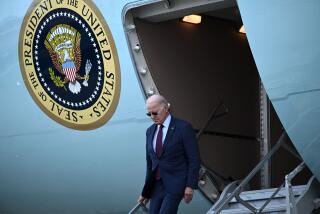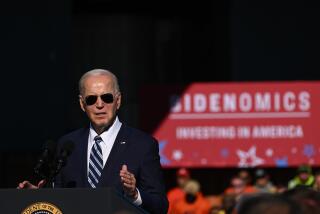In Cleveland, a battle for the economy
The narrative that haunts Cleveland — former empire of iron and steel, shipping and rail — has followed it for decades: the collapse of the manufacturing economy, the erosion of jobs, the exodus of residents.
But Cleveland has weathered this recession much better than past slumps, as local industries have retooled and reinvented themselves. Old shops and factories have embraced new technologies. And for the first time in a while, there are grounds for optimism.
That new story line is what draws President Obama to the city Tuesday, as he works to sell his new budget plan and the broader philosophy on which it relies. The American economy should update itself Cleveland-style, he believes, and the federal government should nudge it along with smartly placed investments.
Republicans such as House Speaker John A. Boehner, an Ohioan, believe quite differently. They maintain Cleveland’s success owes to innovation by business, and that the best way for government to help is to get out of the way — in budget terms, by cutting spending and taxes.
Both Obama and Boehner appear to be partly right about what is responsible for Cleveland’s fortunes, and both are pushing to advance their own approach. Obama’s budget for 2012 increases investments in infrastructure, technology and education. The House last week proposed slicing $61 billion from the government’s budget for the rest of 2011, cutting local economic-development programs in the process.
The debate is anything but esoteric for this region, and the outcome stands to be keenly felt here, as a city perched on the edge of recovery wonders whether the prevailing political tide will rush it forward or knock it back.
“We feel like we’re turning a corner,” said Brad Whitehead, president of the Fund for Our Economic Future, a Northern Ohio economic-development group. “We’re doing something that’s working. We can’t stop now.”
Like every other city, Cleveland has suffered joblessness and underemployment the past three years. In dramatic contrast with other downturns of the past 30 years, however, the jobless and productivity rates here have tracked with the national average instead of being much worse.
“All the sectors have weathered it better than they have in the past,” said LeRoy Brooks, an economist and professor at nearby John Carroll University. “That’s the nature of moving from basic commodities to worldwide-demanded specialty products using those commodities.”
In Cleveland, the remaining steel mills have come to specialize in higher-end materials. Old plastics and glassware factories now make things such as cellphone heat-shields that compete with the best products coming out of Japan. A Lake Erie wind farm could soon stand just miles away from where the Cleveland Browns play football.
The Cleveland Clinic, a global healthcare titan, along with the local University Hospitals, has spawned a growing biomedical industry.
It’s private businesses like those that Obama thinks the government should invest in, to urge the economy toward jobs and industries that will be globally competitive over the long haul. The area has taken a regional economic approach, setting aside community-based rivalries that have forced neighboring communities to compete for federal dollars.
“The reinvention you’ve seen is being driven by smaller-sized businesses, as opposed to the big factories reopening,” Austan Goolsbee, chairman of the president’s Council of Economic Advisors, said in an interview.
“It’s not that government is the main driver of private sector innovation,” Goolsbee said. “But in a lot of areas, the government sets the rules of the road and provides incentives to encourage them to reinvest in the workforce, and to locate their investments in the U.S. President Obama’s been doing that.”
During his term, Obama has trimmed taxes for small businesses and focused small-business lending programs on community banks in post-industrial regions such as northeast Ohio.
The Recovery Act boosted construction in mass transit, light rail, highways and home energy improvements, which the administration says helped to create or protect 133,000 jobs in greater Cleveland.
Those projects not only push the economy in the right direction, said Goolsbee, but they promote a more general economic health that enables private investment.
Obama would further spur those young industries using government investment in medical and scientific research, and in education programs creating a more technically and scientifically educated workforce. The White House wants to help place capital in the hands of innovators at the early stages of product development, where the money is most urgently needed.
“That is an effective role government can play,” said Baiju Shah, president and chief executive of BioEnterprise, a Cleveland-based company that partners with the Cleveland Clinic and others to help spur growth in the healthcare sector. “You can immediately get that money flowing.”
Obama also promises to reduce the tax burden on many corporations, overhaul federal regulations and reform the corporate tax code to create what he calls a “level playing field.”
Republicans contend that the president’s approach inhibits growth rather than spurring it.
Boehner chose Cleveland last summer to deliver a key economic address, railing against government spending and what he termed were job-killing federal regulations.
And he reiterated his philosophy Saturday after the House passed its spending bill: “Cutting federal spending is critical to reducing economic uncertainty, encouraging private-sector investment and creating a better environment for job creation in our country. We will not stop here in our efforts to cut spending, not when we’re broke and Washington’s spending binge is making it harder to create jobs.”
The spending plan adopted by Republican lawmakers over the weekend eliminates some Obama priorities wholesale, such as high-speed rail. It also slices job-training programs that the GOP maintains are wasteful. It slashes the U.S. Economic Development Administration, which has provided money to Cleveland in the past.
Sen. Rob Portman, an Ohio Republican recently elected on a platform of job creation in the state, said the federal budget deficit is the biggest threat to the local economy because it ties up access to private capital.
Among other things, Portman seeks to roll back the reach of the Environmental Protection Agency, which he said would stimulate the local energy-based economy. He also said he believes increased trade will help the region and is an advocate for proposed trade pacts with South Korea, Colombia and Panama. Trade “is an immediate job creator,” Portman said.
The GOP wants to repeal Obama’s healthcare overhaul, which analysts said would have a mixed effect in the region. On one hand, the law would benefit the local hospitals by increasing the number of insured patients in the system. On the other, said BioEnterprises’ Shah, the taxes and fees on medical-device makers is slowing the growth of that industry.
But worst of all, he said, is the climate of uncertainty surrounding the act.
“We sense this debate is not going to get settled anytime soon,” Shah said. “That causes us great concern.”
Parsons reported from Cleveland, Oliphant from Washington.
More to Read
Start your day right
Sign up for Essential California for news, features and recommendations from the L.A. Times and beyond in your inbox six days a week.
You may occasionally receive promotional content from the Los Angeles Times.







